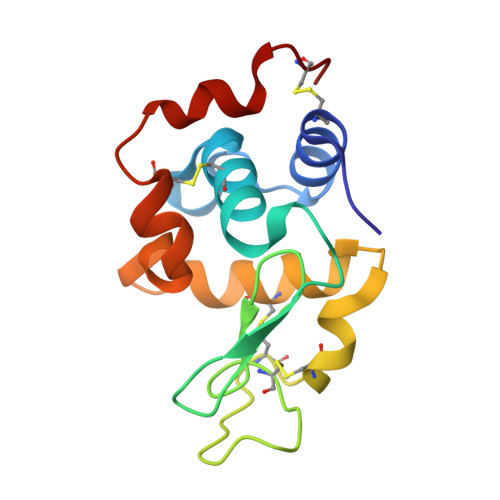Strong in vivo maturation compensates for structurally restricted H3 loops in antibody repertoires.
De Genst, E., Silence, K., Ghahroudi, M.A., Decanniere, K., Loris, R., Kinne, J., Wyns, L., Muyldermans, S.(2005) J Biological Chem 280: 14114-14121
- PubMed: 15659390
- DOI: https://doi.org/10.1074/jbc.M413011200
- Primary Citation of Related Structures:
1RI8, 1RJC - PubMed Abstract:
A central paradigm in immunology states that successful generation of high affinity antibodies necessitates an immense primary repertoire of antigen-combining sites. Much of the diversity of this repertoire is provided by varying one antigen binding loop, created by inserting randomly a D (diversity) gene out of a small pool between the V and J genes. It is therefore assumed that any particular D-encoded region surrounded by different V and J regions adopts a different conformation. We have solved the structure of two lysozyme-specific variable domains of heavy-chain antibodies isolated from two strictly unrelated dromedaries. These antibodies recombined identical D gene sequences to different V and J precursors with significant variance in their V(D)J junctions. Despite these large differences, the D-encoded loop segments adopt remarkably identical architectures, thus directing the antibodies toward identical epitopes. Furthermore, a striking convergent maturation process occurred in the V region, adapting both binders for their sub-nanomolar affinity association with lysozyme. Hence, on a structural level, humoral immunity may rely more on well developed maturation and selection systems than on the acquisition of large primary repertoires.
- Laboratory of Cellular and Molecular Immunology, Department of Molecular and Cellular Interactions, Vlaams Interuniversitair Instituut voor Biotechnologie, Vrije Universiteit Brussel, Pleinlaan 2, B-1050 Brussels, Belgium. edegenst@vub.ac.be
Organizational Affiliation:


















